By Leen Randell
Updated: Jul 03, 2024
10 Best Herbal Teas For Psoriasis
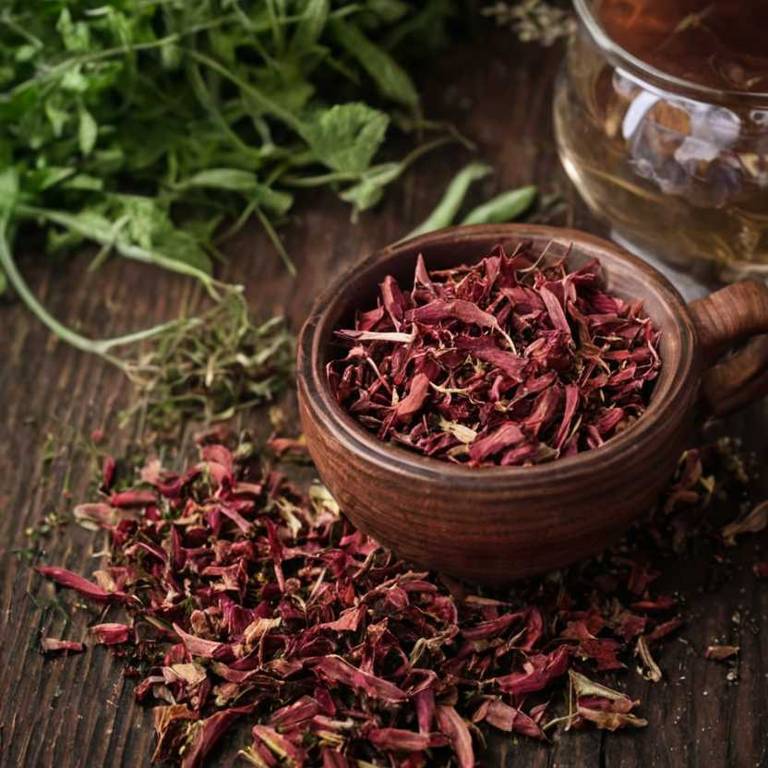
Herbal teas for psoriasis are natural remedies that help alleviate the symptoms of this chronic skin condition.
These teas are made from herbs rich in antioxidants, anti-inflammatory compounds, and vitamins that soothe and calm the skin. Examples include chamomile, turmeric, and ginkgo biloba teas, which reduce inflammation, promote skin healing, and improve overall well-being.
Drinking these teas can lead to reduced skin irritation, improved skin elasticity, and enhanced quality of life for individuals suffering from psoriasis.
The following article describes in detail the most important teas for psoriasis, including medicinal properties, parts of herbs to use, and recipes for preparations.
- 1. Aloe vera
- 2. Urtica dioica
- 3. Taraxacum officinale
- 4. Althaea officinalis
- 5. Calendula officinalis
- 6. Ginkgo biloba
- 7. Rhus glabra
- 8. Lavandula angustifolia
- 9. Sesamum indicum
- 10. Tilia europaea
- What is the best combination of herbal teas to use for psoriasis?
- What ailments similar to psoriasis are treated with herbal teas?
1. Aloe vera
Aloe vera, also known as aloe, teas helps with psoriasis because of its anti-inflammatory and antioxidant properties.
The soothing gel extracted from the aloe plant is known to calm irritated skin, reducing redness and discomfort associated with psoriasis. Drinking aloe vera tea may also help to reduce inflammation and promote skin cell growth, leading to improved skin health and potentially reducing psoriasis symptoms.
Its natural compounds may also help to regulate the immune system, further alleviating psoriasis symptoms.
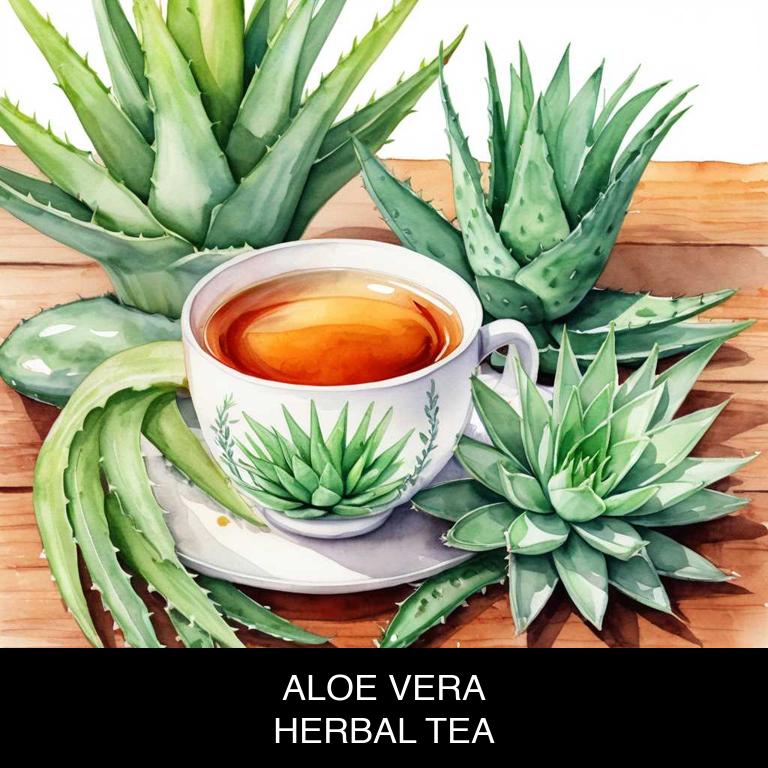
Medicinal Constituents
The list below shows the primary medicinal constituents in Aloe vera teas that help with psoriasis.
- Anthraquinones: These glycosides exhibit anti-inflammatory properties, which can help reduce redness and swelling associated with psoriasis.
- Polysaccharides: Aloe vera's polysaccharides have been found to stimulate collagen synthesis and promote wound healing, which can aid in the repair of damaged skin in psoriasis patients.
- Acemannan: A type of polysaccharide, acemannan has been shown to possess anti-inflammatory and immunomodulatory effects, helping to regulate the immune response and reduce inflammation in psoriasis.
Parts Used
The list below shows the primary parts of aloe used to make teas for psoriasis.
- Leaves: The gel from Aloe vera leaves is commonly used to make teas for psoriasis due to its soothing and anti-inflammatory properties.
- Leaves (gel): The gel from the Aloe vera leaves is also commonly used to make teas for psoriasis because it contains vitamins and minerals that help to reduce inflammation and promote healing.
- Leaves (pulp): The pulp from the Aloe vera leaves is used to make teas for psoriasis as it is rich in antioxidants and has anti-inflammatory properties that help to soothe and calm the skin.
Quick Recipe
The following recipe gives a procedure to make a basic aloe for psoriasis.
- Harvest fresh aloe vera leaves from a mature plant with thick fleshy leaves.
- Rinse the leaves under cold running water to remove any dirt or debris.
- Chop the leaves into small pieces weighing approximately 20 grams per cup of tea.
- Steep the aloe vera pieces in 1 liter of boiling water for 10 to 15 minutes.
- Strain the tea through a cheesecloth or fine-mesh sieve to remove the solids.
2. Urtica dioica
Urtica dioica, also known as stinging nettle, teas helps with psoriasis because it is rich in antioxidants, flavonoids, and other beneficial compounds that have anti-inflammatory properties.
These properties help to reduce inflammation and soothe skin irritation associated with psoriasis. The tea also contains uric acid, which is involved in the regulation of skin health and can help to reduce the severity of psoriasis symptoms.
Additionally, stinging nettle tea may also help to improve skin elasticity and reduce scaling, making it a potential natural remedy for managing psoriasis symptoms.

Medicinal Constituents
The list below shows the primary medicinal constituents in Urtica dioica teas that help with psoriasis.
- Flavonoids: These plant compounds have anti-inflammatory properties, which can help reduce the inflammation and redness associated with psoriasis.
- Phenolic acids: These compounds have antioxidant and anti-inflammatory effects, which can help protect the skin from damage and promote healing in psoriasis-affected areas.
- Iridoid glycosides: These compounds have anti-inflammatory and immunomodulatory effects, which can help regulate the immune system's response to psoriasis and reduce symptoms such as itching and scaling.
Parts Used
The list below shows the primary parts of stinging nettle used to make teas for psoriasis.
- Leaves: They contain compounds like salicylic acid and flavonoids, which help to reduce inflammation and itching associated with psoriasis.
- Roots: They are rich in antioxidants and other bioactive compounds that may help to soothe and calm the skin, reducing symptoms of psoriasis.
- Stems: Like leaves, stems of Urtica dioica contain salicylic acid and other anti-inflammatory compounds that can help to treat psoriasis.
Quick Recipe
The following recipe gives a procedure to make a basic stinging nettle for psoriasis.
- Harvest the leaves and stems of the plant, cut them into small pieces, and dry them thoroughly in a cool place for 2 weeks.
- Grind 2-4 teaspoons of dried plant material into a fine powder using a spice grinder or mortar and pestle.
- Steep 1 teaspoon of the ground plant material in a cup of boiling water for 5-7 minutes to release its active compounds.
- Strain the liquid through a fine-mesh sieve or cheesecloth into a cup, pressing on the solids to extract as much liquid as possible.
- Allow the tea to cool to a comfortable drinking temperature, then consume it immediately to reap its potential benefits.
3. Taraxacum officinale
Taraxacum officinale, also known as dandelion, teas helps with psoriasis because of its anti-inflammatory and antioxidant properties.
The tea's compounds, such as flavonoids and phenolic acids, have been shown to reduce inflammation and promote skin health. Dandelion tea may also help to balance the body's natural pH levels, which can become imbalanced in people with psoriasis.
Additionally, the tea's diuretic properties can help to remove toxins from the body, reducing the severity of psoriasis symptoms.

Medicinal Constituents
The list below shows the primary medicinal constituents in Taraxacum officinale teas that help with psoriasis.
- Phenolic acids: These compounds, particularly taraxasterol and taraxeryl acetate, have anti-inflammatory and antioxidant properties, which can help reduce the redness and inflammation associated with psoriasis.
- Flavonoids: Quercetin, a flavonoid present in Taraxacum officinale, has been shown to possess anti-inflammatory and immunomodulatory effects, which may help alleviate psoriasis symptoms.
- Saponins: These compounds have been found to possess anti-inflammatory and antipruritic (itch-reducing) properties, which can help alleviate the itching and inflammation associated with psoriasis.
Parts Used
The list below shows the primary parts of dandelion used to make teas for psoriasis.
- Leaves: The leaves are the most commonly used part for making teas for psoriasis due to their high concentration of antioxidants and anti-inflammatory compounds.
- Roots: The roots of Taraxacum officinale are also used for teas, as they contain sesquiterpene lactones that have been shown to have anti-inflammatory and immunomodulatory effects.
- Flowers: The flowers of Taraxacum officinale are used for teas due to their high content of flavonoids, which have been found to have anti-inflammatory and antioxidant properties that may help alleviate psoriasis symptoms.
Quick Recipe
The following recipe gives a procedure to make a basic dandelion for psoriasis.
- Harvest taraxacum officinale roots in late summer or early fall when they are at their highest concentration.
- Dry the roots in a single layer at 40 degrees celsius for 24 hours to remove excess moisture.
- Grind 2-3 grams of dried taraxacum officinale root into a fine powder using a mortar and pestle.
- Steep 1 teaspoon of taraxacum officinale powder in 250 milliliters of boiling water for 5-10 minutes to release active compounds.
- Strain the tea through a cheesecloth or fine-mesh sieve into a cup to remove solids and enjoy.
4. Althaea officinalis
Althaea officinalis, also known as marshmallow, teas helps with psoriasis because of its anti-inflammatory properties.
The mucilages present in the plant soothe and calm irritated skin, reducing redness and inflammation associated with psoriasis. The tea's demulcent action helps to lock in moisture, promoting a healthy skin barrier and relieving dryness and itchiness. Additionally, the antioxidant properties in Althaea officinalis may help to reduce oxidative stress, a known contributor to psoriasis symptoms.
This natural remedy offers a holistic approach to managing psoriasis symptoms.
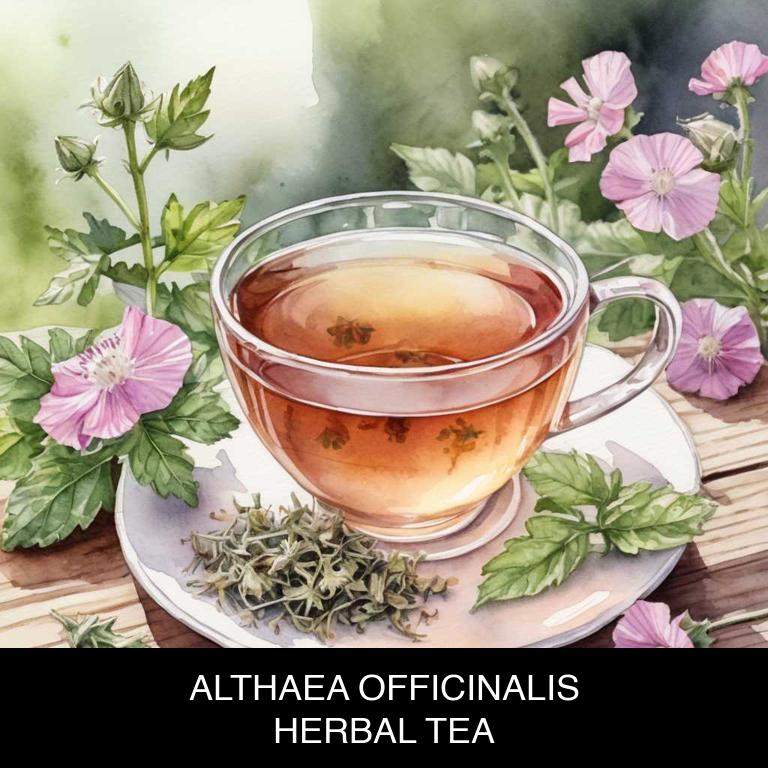
Medicinal Constituents
The list below shows the primary medicinal constituents in Althaea officinalis teas that help with psoriasis.
- Mucilages: Mucilages help to soothe and calm the skin, reducing inflammation and itching associated with psoriasis.
- Gallic acid: Gallic acid has anti-inflammatory and antioxidant properties, which can help to reduce the severity of psoriasis symptoms and prevent further skin damage.
- Althaea officinalis polysaccharides: These polysaccharides have been shown to have anti-inflammatory and immunomodulatory effects, which can help to reduce the inflammation and immune response associated with psoriasis.
Parts Used
The list below shows the primary parts of marshmallow used to make teas for psoriasis.
- Roots: The roots of Althaea officinalis are primarily used to make teas for psoriasis due to their high mucilage content, which helps soothe and calm irritated skin.
- Leaves: The leaves are used to make teas for psoriasis because they contain anti-inflammatory properties that help reduce redness and swelling associated with the condition.
- Stems: The stems of Althaea officinalis are used to make teas for psoriasis due to their ability to provide relief from itchiness and irritation, often associated with psoriasis.
Quick Recipe
The following recipe gives a procedure to make a basic marshmallow for psoriasis.
- Harvest 2 ounces of dried root or 4 ounces of fresh root of althaea officinalis in late summer or early fall.
- Dry the harvested root in a single layer at 105 degrees fahrenheit for 2 to 3 hours.
- Grind the dried root into a fine powder using a spice grinder or mortar and pestle.
- Combine 1 teaspoon of the ground root powder with 8 ounces of boiling water in a teapot.
- Steep the mixture for 5 to 10 minutes then strain and serve while still warm.
5. Calendula officinalis
Calendula officinalis, also known as pot marigold, teas helps with psoriasis because of its anti-inflammatory and antioxidant properties.
The tea is rich in flavonoids and carotenoids, which help to reduce inflammation and promote healing in the skin. Calendula's ability to soothe and calm irritated skin makes it an effective treatment for psoriasis symptoms such as redness, itching, and scaling.
By reducing inflammation and promoting healing, Calendula officinalis teas can help to alleviate the discomfort and appearance of psoriasis.

Medicinal Constituents
The list below shows the primary medicinal constituents in Calendula officinalis teas that help with psoriasis.
- Flavonoids: These plant-derived compounds have potent anti-inflammatory properties, which can help reduce redness and inflammation associated with psoriasis.
- Carotenoids: Specifically, carotenoids like beta-carotene and lutein can help soothe and calm irritated skin, promoting healing and reducing the severity of psoriasis symptoms.
- Phenolic acids: Phenolic acids in Calendula officinalis, such as caffeic acid and ferulic acid, possess strong antioxidant and anti-inflammatory properties, which can help reduce oxidative stress and inflammation in psoriasis-affected skin.
Parts Used
The list below shows the primary parts of pot marigold used to make teas for psoriasis.
- Flowers: The flowers of Calendula officinalis are commonly used to make teas for psoriasis due to their anti-inflammatory and antiseptic properties.
- Leaves: The leaves are used to make teas for psoriasis as they are rich in antioxidants and have anti-inflammatory properties that help soothe skin irritations.
- Roots: The roots of Calendula officinalis are sometimes used to make teas for psoriasis, but this is less common, as they are more typically used in tinctures and ointments for their antiseptic and anti-inflammatory properties.
Quick Recipe
The following recipe gives a procedure to make a basic pot marigold for psoriasis.
- Harvest 20-30 calendula officinalis flowers when they are in full bloom to ensure optimal potency.
- Gently dry the flowers in a single layer on paper towels or a clean cloth for 7-10 days.
- Store dried calendula flowers in airtight containers to preserve their medicinal properties for up to 6 months.
- Use 1-2 teaspoons of dried flowers for every 8 ounces of boiling water and steep for 5-7 minutes.
- Strain the tea and discard the solids to enjoy the warm, soothing liquid as needed.
6. Ginkgo biloba
Ginkgo biloba, also known as maidenhair tree, teas helps with psoriasis because of its potent anti-inflammatory and antioxidant properties.
The tea's flavonoids and terpenoids work to reduce inflammation and oxidative stress, which are major contributors to the development and exacerbation of psoriasis. By modulating the immune system and improving blood flow, Ginkgo biloba tea may help to reduce redness, itching, and scaling associated with the condition.
Additionally, its antioxidant properties may help to repair damaged skin and promote overall skin health.

Medicinal Constituents
The list below shows the primary medicinal constituents in Ginkgo biloba teas that help with psoriasis.
- Flavonoids: These compounds have anti-inflammatory properties that may help reduce redness, itching, and swelling associated with psoriasis.
- Bilobalide: This sesquiterpene lactone has anti-inflammatory and antioxidant effects, which may help soothe and calm the skin, reducing the severity of psoriasis symptoms.
- Quercetin: As a flavonoid, quercetin has potent anti-inflammatory and antioxidant properties that may help reduce inflammation and oxidative stress, which are often involved in the development and progression of psoriasis.
Parts Used
The list below shows the primary parts of maidenhair tree used to make teas for psoriasis.
- Leaves: They are rich in flavonoids and terpenoids, which are believed to have anti-inflammatory and antioxidant properties that can help alleviate psoriasis symptoms.
- Seeds: They are a good source of ginkgolic acids, which have been traditionally used to treat skin conditions, including psoriasis, by reducing inflammation and promoting skin health.
- Barks: They contain flavonoids and other compounds that have been shown to have anti-inflammatory and antioxidant effects, which can help soothe and calm psoriasis symptoms.
Quick Recipe
The following recipe gives a procedure to make a basic maidenhair tree for psoriasis.
- Measure out 1 teaspoon of dried ginkgo biloba leaves per 8 ounces of water for a standard serving size.
- Steep the dried leaves in boiling water for 5 to 7 minutes to release their active compounds.
- Strain the tea through a fine-mesh sieve into a cup to remove the solids and leaves.
- Add honey or lemon to taste if desired to enhance the flavor and palatability of the tea.
- Allow the tea to cool to a comfortable temperature before serving and consuming it immediately.
7. Rhus glabra
Rhus glabra, also known as smooth sumac, teas helps with psoriasis because of its anti-inflammatory and antioxidant properties.
The tea has been traditionally used to reduce inflammation and itching associated with psoriasis. The plant's ability to reduce inflammation and promote skin regeneration may help in soothing the symptoms of the condition.
Additionally, the tea's antioxidant properties can help protect the skin from oxidative stress, which can contribute to the development and progression of psoriasis.
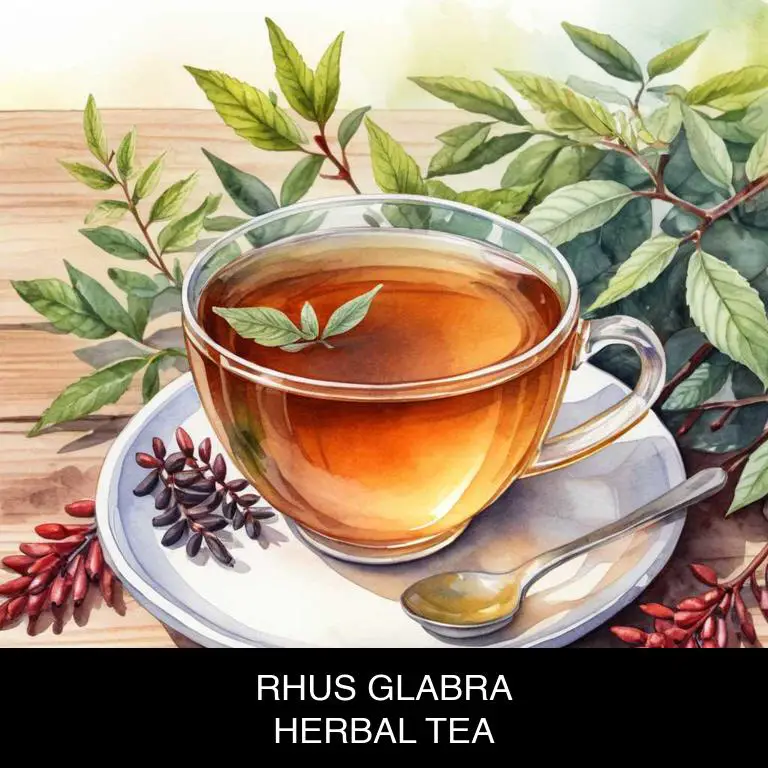
Medicinal Constituents
The list below shows the primary medicinal constituents in Rhus glabra teas that help with psoriasis.
- Flavonoids: Flavonoids in Rhus glabra tea have anti-inflammatory properties, which can help reduce inflammation and alleviate symptoms of psoriasis.
- Tannins: Tannins in Rhus glabra tea have astringent and anti-inflammatory effects, which can help soothe and calm the skin affected by psoriasis.
- Phenolic acids: Phenolic acids in Rhus glabra tea have antioxidant and anti-inflammatory properties, which can help protect the skin from oxidative stress and reduce inflammation associated with psoriasis.
Parts Used
The list below shows the primary parts of smooth sumac used to make teas for psoriasis.
- Leaves: Used due to their anti-inflammatory and antioxidant properties, which can help soothe and calm psoriasis symptoms.
- Stems: Utilized for their potential to reduce inflammation and itching associated with psoriasis.
- Barks: Employed for their anti-inflammatory and antiseptic properties, which may help alleviate psoriasis symptoms.
Quick Recipe
The following recipe gives a procedure to make a basic smooth sumac for psoriasis.
- Harvest the rhus glabra leaves in early spring or late summer when they are at their highest potency levels.
- Clean the harvested leaves thoroughly with water to remove any dirt or debris present.
- Steep one teaspoon of dried rhus glabra leaves in one cup of boiling water for 5 to 7 minutes.
- Strain the tea mixture through a fine mesh sieve into a separate container to remove solids.
- Store the herbal tea in an airtight container in the refrigerator for up to 24 hours.
8. Lavandula angustifolia
Lavandula angustifolia, also known as English lavender, teas helps with psoriasis because of its anti-inflammatory and antiseptic properties.
The calming effects of the tea are believed to reduce stress, which can exacerbate psoriasis symptoms. The antioxidants present in the tea help to soothe and calm the skin, reducing redness and inflammation associated with the condition.
Additionally, the tea's ability to promote relaxation and improve sleep quality can also contribute to overall skin health and potentially alleviate psoriasis symptoms.

Medicinal Constituents
The list below shows the primary medicinal constituents in Lavandula angustifolia teas that help with psoriasis.
- Linalool: This terpene has anti-inflammatory and antimicrobial properties, which can help soothe and calm the skin, reducing inflammation and discomfort associated with psoriasis.
- Linalyl acetate: This terpene also has anti-inflammatory and antioxidant properties, which may help reduce the severity of psoriasis symptoms, such as redness and scaling.
- Rosmarinic acid: This phenolic compound has anti-inflammatory and antioxidant properties, which can help reduce inflammation and oxidative stress in the skin, potentially alleviating psoriasis symptoms.
Parts Used
The list below shows the primary parts of english lavender used to make teas for psoriasis.
- Leaves: They are used to make teas due to their antiseptic and anti-inflammatory properties that help soothe and calm irritated skin.
- Flowers: They are used to create teas that possess antiseptic, antifungal, and anti-inflammatory properties, which can help reduce inflammation and promote skin healing.
- Stems: They are used in teas due to their ability to provide a natural source of antioxidants and anti-inflammatory compounds that can aid in skin regeneration and calming.
Quick Recipe
The following recipe gives a procedure to make a basic english lavender for psoriasis.
- Harvest 30-60 grams of fresh or 20-40 grams of dried lavandula angustifolia flowers.
- Dry the harvested flowers in a single layer at 30-40 degrees celsius for 2 hours.
- Grind 2-3 teaspoons of dried lavandula angustifolia flowers into a fine powder using a mill.
- Steep 1 teaspoon of the ground flowers in 250 milliliters of boiling water for 5-7 minutes.
- Strain the tea and serve it immediately or store it in an airtight container in the refrigerator.
9. Sesamum indicum
Sesamum indicum, also known as sesame, teas helps with psoriasis because of its anti-inflammatory and antioxidant properties.
The tea is rich in sesamin, which has been shown to have a positive effect on skin health. It helps to reduce inflammation, soothe irritation, and promote the healing process. Additionally, the antioxidants present in the tea help to protect the skin from damage caused by free radicals, which can exacerbate psoriasis symptoms.
This makes Sesamum indicum tea a promising natural remedy for managing psoriasis.
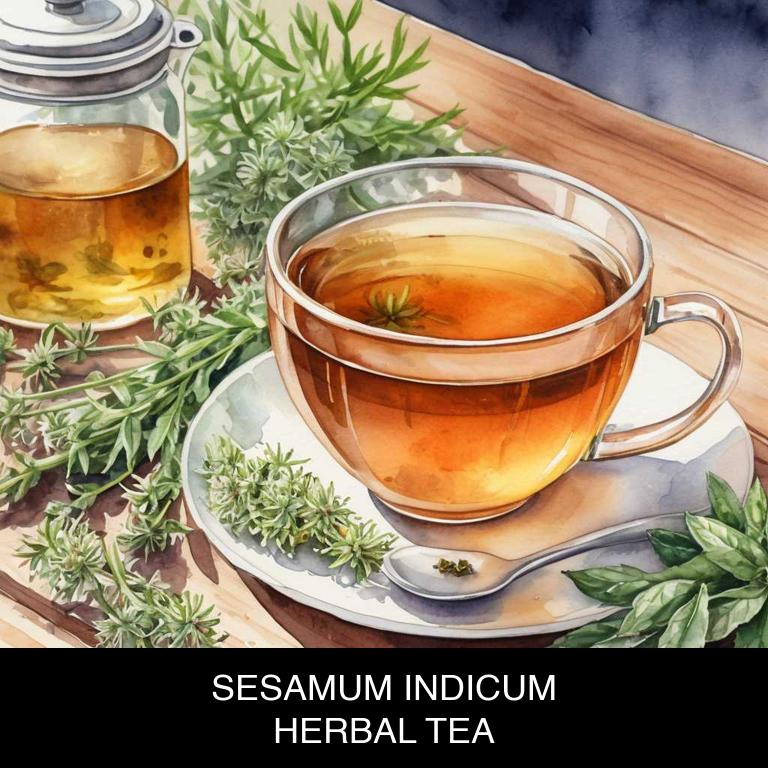
Medicinal Constituents
The list below shows the primary medicinal constituents in Sesamum indicum teas that help with psoriasis.
- Fatty acids: Fatty acids in Sesamum indicum teas, particularly oleic acid and linoleic acid, help to reduce inflammation and promote the repair of skin cells, which can aid in the management of psoriasis symptoms.
- Tannins: Tannins in Sesamum indicum teas have anti-inflammatory and astringent properties, which can help to reduce redness, itching, and scaling associated with psoriasis.
- Phenolic acids: Phenolic acids, such as ferulic acid and sinapic acid, in Sesamum indicum teas have antioxidant and anti-inflammatory properties, which can help to reduce oxidative stress and inflammation in the skin, thereby alleviating psoriasis symptoms.
Parts Used
The list below shows the primary parts of sesame used to make teas for psoriasis.
- Leaves: They are used due to their anti-inflammatory and antioxidant properties, which can help alleviate psoriasis symptoms.
- Seeds: Sesame seeds are used for their omega-6 fatty acids, which can help reduce inflammation and promote skin health.
- Buds: Sesamum indicum buds are used due to their antibacterial and antifungal properties, which can help prevent infections associated with psoriasis.
Quick Recipe
The following recipe gives a procedure to make a basic sesame for psoriasis.
- Harvest 2-3 grams of dried sesamum indicum flowers at the peak of flowering stage.
- Grind the dried flowers into a fine powder using a mortar and pestle for 5 minutes.
- Steep 1 teaspoon of the ground powder in 200 milliliters of boiling water for 5-7 minutes.
- Strain the tea using a cheesecloth or a fine-mesh sieve into a cup.
- Allow the tea to cool down completely before consumption within 10 minutes.
10. Tilia europaea
Tilia europaea, also known as lime, teas helps with psoriasis because of its anti-inflammatory and antioxidant properties.
The tea is rich in flavonoids, which have been shown to reduce redness and swelling associated with psoriasis. Additionally, the tea's astringent properties help to reduce the scaling and flaking of skin, promoting a smoother and healthier complexion.
This natural remedy may also help to soothe and calm irritated skin, providing relief from the symptoms of psoriasis.
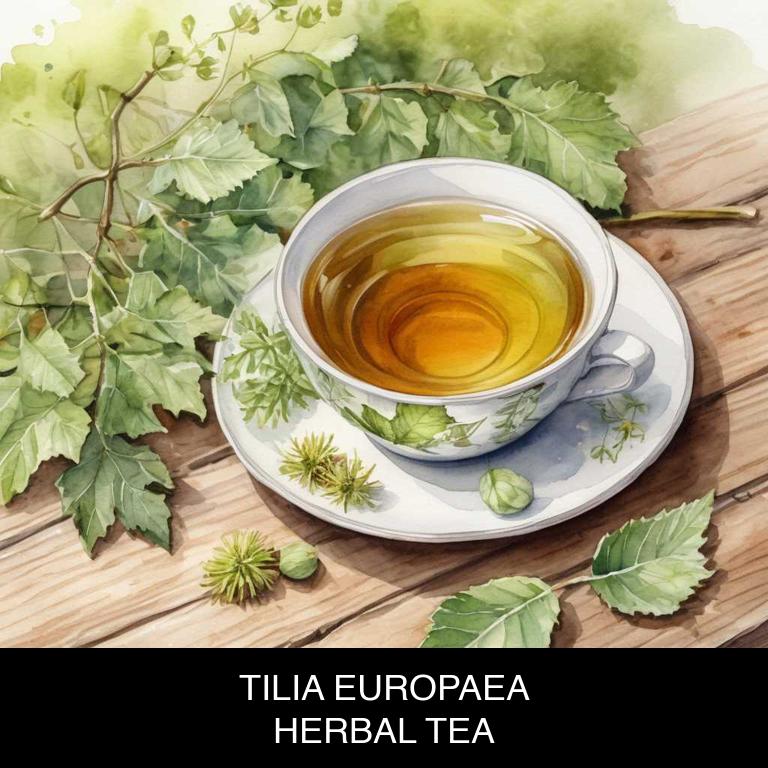
Medicinal Constituents
The list below shows the primary medicinal constituents in Tilia europaea teas that help with psoriasis.
- Flavonoids: These plant compounds have anti-inflammatory and antioxidant properties, which can help reduce inflammation and oxidative stress associated with psoriasis.
- Triterpenoids: These compounds have been shown to have anti-inflammatory and antimicrobial effects, which can help alleviate symptoms of psoriasis, such as redness and irritation.
- Rosmarinic acid: This phenolic compound has potent anti-inflammatory and antioxidant properties, which can help reduce inflammation, promote wound healing, and protect the skin from further damage.
Parts Used
The list below shows the primary parts of lime used to make teas for psoriasis.
- Leaves: Tilia europaea leaves are used to make teas for psoriasis due to their anti-inflammatory properties.
- Buds: Tilia europaea buds are used to make teas for psoriasis because they contain flavonoids that may help soothe and calm affected skin.
- Leaves: Tilia europaea leaves are also used to make teas for psoriasis due to their antiseptic properties that can help reduce inflammation and promote healing.
Quick Recipe
The following recipe gives a procedure to make a basic lime for psoriasis.
- Harvest 20-30 tilia europaea leaves and flowers in the morning after the dew has evaporated.
- Dry the collected leaves and flowers in a warm place for 2-3 days.
- Chop 1 teaspoon of dried flowers and leaves into smaller pieces for infusion.
- Steep the chopped mixture in 8 ounces of boiling water for 5-7 minutes.
- Strain the infusion and let it cool to room temperature for 10-15 minutes before serving.
What is the best combination of herbal teas to use for psoriasis?
The best combination of herbal teas that help with psoriasis is a blend of calendula, chamomile, and green tea.
Calendula tea, rich in anti-inflammatory properties, helps soothe and calm irritated skin. Chamomile tea, with its gentle antiseptic and anti-inflammatory properties, reduces inflammation and promotes relaxation.
Green tea, high in antioxidants, protects the skin from damage and promotes healing. Drinking a warm tea infused with these herbs may help alleviate psoriasis symptoms and promote overall skin health.
Consult a healthcare professional before trying any new remedies.
What ailments similar to psoriasis are treated with herbal teas?
Ailments similar to psoriasis/teas.html">psoriasis/teas.html">psoriasis that are treated with herbal teas are eczema, dermatitis, and acne.
Herbs like calendula, chamomile, and green tea have anti-inflammatory properties that can help soothe and calm irritated skin. Other herbs like turmeric, ginger, and neem have antimicrobial properties that can help reduce inflammation and prevent infection in the skin.
Drinking these herbal teas can provide relief from symptoms such as itching, redness, and flakiness associated with these conditions.